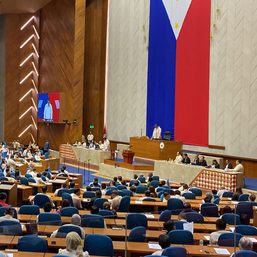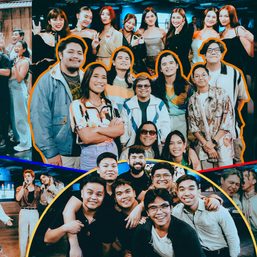SUMMARY
This is AI generated summarization, which may have errors. For context, always refer to the full article.

Last of 2 parts
Part 1 | Daddy provides: Filipinos turn to sugar dating to achieve living wages
MANILA, Philippines – As many would say, money is power. Women at the receiving end of sugar relationships – especially if motivated by survival – are at risk of being subjected to whatever the provider wants from them, be it services or sex.
But sugar babies like Stephanie and Amia challenge such subordination in establishing strict boundaries for themselves, with no need for explanations.
Nothing more, nothing less
When engaging in the sugar dating platform, Stephanie, who asked her surname to be withheld, always makes clear her two no-nos: a romantic relationship and intimacy. Her priority lies with education.
“I tell them that straight up: ‘If you purely want something intimate out of me, then this will not work for the both of us,’” she said.
If the men don’t agree, so be it. There will always be a next one. But sometimes, men question why Stephanie has such boundaries. “Then why are you here?” they’d ask.
“I don’t want to be the one to explain myself because…that’s my rules for myself,” she said. Any aggression can be dealt with a no response, a block, or a report.
Stephanie and Amia, as well as sugar dating platform Sugarbook CEO Darren Chan, want to debunk the idea that sugar dating can be equated to prostitution. In their interviews with Rappler, the two young women referred to their partners more as “friends,” instead of just sugar daddies.
For Chan, the core of sugar dating is a relationship – two individuals seeking a connection which “often extends beyond just the financial aspect.”
“Many sugar relationships involve companionship, mentorship, and emotional connections. Prostitution, on the other hand, is largely transactional and doesn’t involve the relationship dynamic inherent in sugar dating,” said Chan.
“Sugar babies are not prostitutes. We have our own choice, so we can say no, and we are very firm with that. We can say no as much as we want and we can make our own decisions,” said Amia, who asked that her real name be withheld.
“Intimacy is not guaranteed when you are a sugar baby. And we all have our boundaries. You can’t just give us money and expect us to lie in bed with you. That is not how sugar dating works,” said Stephanie.
Stephanie added that, while she herself is not comfortable with intimacy, sugar babies who are shouldn’t be stigmatized.
“As long as they’re comfortable with their sugar daddy and they’re not being forced to do anything against their will, then I support them.”
Stigma and safety
According to Nathalie Africa-Verceles, gender studies professor and former director of the University of the Philippines Center for Women’s and Gender Studies, the fact that sugar dating can be construed as treading very closely to prostitution discourages women from being open about their relationships for fear of being stigmatized.
“Society will very readily assume that this relationship involves sex automatically. Because it’s perhaps difficult for them to believe that such a relationship between a younger, less affluent woman and an older, wealthier man would not involve sex and money,” said Verceles.
But sometimes, letting trusted people know about one’s setups can be the key to dating safely, just like regular relationships.
Taking steps to ensure her safety when meeting her sugar daddies in person, Stephanie involves her mother. Both her parents are aware that she is seeing men who financially support her.
And while Stephanie’s mom is concerned about her daughter’s safety, the two maintain open communication about her arrangements. Her father, meanwhile, has learned to accept her arrangements as he believes that men should be providing for women.
As Stephanie usually engages with businessmen, she does a background check on the internet and social media whenever she’s keen on pursuing an arrangement with someone. Video calls are always a requirement for her prior to meeting in person.
Whenever Stephanie steps out, she tells her mother and some friends where she’s going, and who she’ll be with. “I always show them a picture. So [I tell them jokingly], ‘If you ever see me on the news, this is who did it,’” she said.
If she’s not back at a certain time and doesn’t give notice about coming home late, she tells her mom and friends, they can call to check in.
Subordination or autonomy?
Among the feminist community, sugar dating is viewed in different ways. According to Verceles, sugar dating should not be seen as a black and white issue.
Sugar dating typically occurs between older, wealthier men and younger, less affluent women. While there are some set-ups between an older woman and a younger man, Verceles said this is less common.
Verceles said that opposition to sugar dating reflects “unequal gender norms about men as providers and women as dependents.”
“It can be said to promote societal expectations around femininity or what it means to be a woman in society where women are often positioned as objects of desire and beauty. It can also be argued that it commodifies women as bodies to be bought and sold in a transaction, and their value is tied to their attractiveness, sexuality, and willingness to provide companionship or render sexual favors,” she said.
Apart from the arguable reinforcement of male dominance and female subordination, sugar dating also spills into the power dynamics of unequal economic status, she said.
“It might be said that in sugar dating, youth and beauty are being traded for economic security, which may raise concerns about the usual exploitation and consent, especially if the age gap is significant,” said Verceles.
In January 2021, then-senator Leila de Lima sought an inquiry into rising sign-ups on sugar dating sites among Filipino women, including students, amid the economic crisis brought about by the COVID-19 pandemic.
De Lima pointed to the experience of certain sugar babies who were coerced into sending nude videos to “sugar daddies” they met on a Facebook group using Sugarbook’s name, but ended up not receiving any money.
Chan said in a GMA News Online report that the Facebook group was fan-made, and they did not have control over community pages using the Sugarbook name. Still, the “fans” who created the group had made Chan an administrator.
Other sugar dating platforms include Sugar Meet & Hookup Me, and Seeking, although it has since rebranded into a “luxury dating” platform. Some Filipinos seeking arrangements also turn to social media, like Facebook, Reddit, and Telegram, although communities may not always thrive.
Reports of abuse in sugar dating continued to prop up. In a December 2022 GMA piece, sugar babies detailed the dark aspects of being in a sugar relationship they entered into out of financial necessity.
According to the GMA story, one case study, Ara, said the worst experience she had in an arrangement was a golden shower, where the man urinates on the woman as a sexual act. She also came close to a violent encounter when one of her sugar daddies came home drunk and was carrying a knife.
“It is likewise necessary to investigate these alleged cases of abuse and exploitation and gather more concrete data regarding this emerging industry in order to further protect women’s and children’s rights amid the looming effects of a global health crisis,” said De Lima in the resolution.
In the case of Sugarbook, Chan describes the community as “vigilant,” as members “actively” look out for one another by promptly reporting any suspicious or inappropriate behavior. Stephanie recalls a time she felt harassed by a user, whom she reported. Within the day, the user was off the site, she said.
Sugarbook also has a verification feature where members are encouraged to authenticate their profiles by submitting an identification document. However, Chan said this is “optional” – which makes it difficult to track down abusive users, especially if a victim wishes to pursue action outside the app.
Beyond reporting on their platform, Sugarbook made no mention of any mechanisms or resources to further assist users who experience abuse.
For Seeking, however, resources are available as the platform advocates against human and sex trafficking. Taking a step beyond mere blocking on the platform, Seeking said it reports to law enforcement any individuals who violate anti-trafficking laws.
“By developing anti-trafficking strategies including ongoing staff training by independent third-party organizations, [artificial intelligence] technology that monitors all profiles and a dedicated 24-hour customer service department, we take every precaution available to keep the Seeking.com community safe, prevent crime, rescue victims, and apprehend criminals,” Seeking says on its website.
It also says that it provides users tips on how to date safely, such as limiting details that are shared, and using photos different from one’s social media image to prevent users from finding their social media accounts.
On the other side of the debate, Verceles said, sugar dating can be seen as an exercise of agency, where women can exercise autonomy in their personal and economic lives. Stephanie and Amia had the choice to keep depending on their overseas Filipino worker-parents, but they opted to gain financial independence and lift some of the burden off their parents’ shoulders.
“It provides women with a degree of control over their relationships. In sugar dating arrangements, women can actively negotiate the terms of the relationship, including financial agreements, boundaries, and expectations. So they allow women to leverage whatever attributes they have, to challenge traditional unequal power in relationships between women and men,” said Verceles.
While not all sugar arrangements have a sexual dimension, women who do choose to offer sex in exchange for money also sometimes do so as an expression of sexual liberation.
“Women have the right to express their sexuality freely and engage in relationships on their own terms, including choosing partners based on mutual benefits. So it can be argued that women participating in sugar dating might do so as an empowered choice,” she said.
Similar debates have been seen on the issue of sex work – some women enter the lifestyle for survival, but others choose sex work as work. The stigma faced by women is compounded by being in a legal tight spot, as sex workers are regarded by Philippine law as criminals and victims.
Living, not just surviving
While inflation rates are easing, many Filipinos still cope with high prices of goods, along with wages that labor groups have constantly called increases for. (WATCH: Workers call for decent wages, job security on Labor Day)
Verceles said it is concerning that young women feel the need to help their parents earn for their families.
“The fact that we are expecting our young women to bear the costs of even their own education and housing…means that there’s just not enough money within the household to support very, very basic needs. So that is problematic, not just for the women who are involved in sugar dating, but also other family members. It means that household family income must be very low,” Verceles said.
The professor said that the data showing most sugar babies using their allowances for basic needs is “just additional data as to how urgent it is when we even have our young people needing to work just for families to survive,” and that it is difficult for young people to find jobs that pay well.
While Amia enjoys a hefty income from both her job and sugar dating, she lamented how some of her friends depend on sugar dating for daily survival.
“Some of them don’t even have food at home…. [With high prices of goods], they don’t have any other choice but to seek another source of income,” said Amia.
Stephanie feels fortunate that she is able to save much of her allowances. For her, it is unacceptable how women sometimes resort to sugar dating just to survive.
“Your P1,000 will not get you food for a week…. No person should work nine-to-five for P14,000 per month and expect them to pay for their own food, for their own fare, for their own needs every day, every single day with no fail. I think that is not a justifiable wage at all,” said Stephanie.
“They just spend that on things that they should be getting in the first place. And I just hope that they get to save some of that for themselves. Because they do deserve that too. I can’t imagine not getting to hold the money that you worked hard for…. Because this is not living, this is just surviving,” she added.
Sugar dating probably won’t be forever for Stephanie and Amia. Amia dreams of starting her own clothing line one day, while Stephanie wants to become a flight attendant.
“I do like the idea of being spoiled forever. But I really want to make a name out of myself too in the next few years,” said Stephanie. – with reports from Nathaniel Vizconde/Rappler.com
Add a comment
How does this make you feel?












![[Two Pronged] I still love my husband, but I’m having an affair with my ex-boyfriend](https://www.rappler.com/tachyon/2024/07/tp-first-love.jpg?resize=257%2C257&crop=269px%2C0px%2C720px%2C720px)
![[DASH OF SAS] Your privilege won’t protect you](https://www.rappler.com/tachyon/2024/07/divorce-violence-against-women.jpg?resize=257%2C257&crop_strategy=attention)
![[Two Pronged] Am I losing my libido now that I’m hitting my 40s?](https://www.rappler.com/tachyon/2024/07/two-pronged-forties-libido.jpg?resize=257%2C257&crop_strategy=attention)

![[OPINION] Unpaid care work by women is a public concern](https://www.rappler.com/tachyon/2024/07/20240725-unpaid-care-work-public-concern.jpg?resize=257%2C257&crop_strategy=attention)








There are no comments yet. Add your comment to start the conversation.